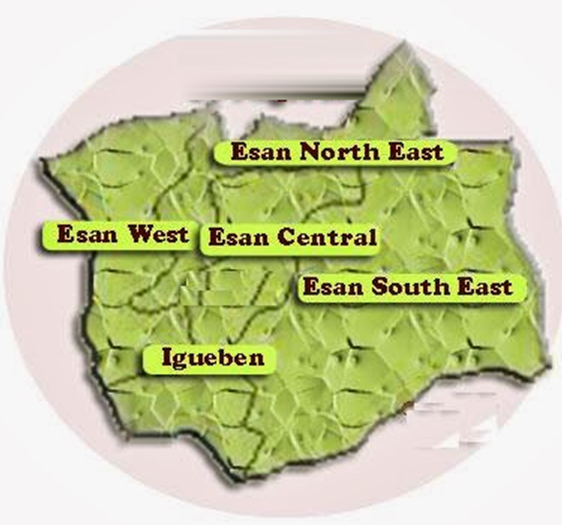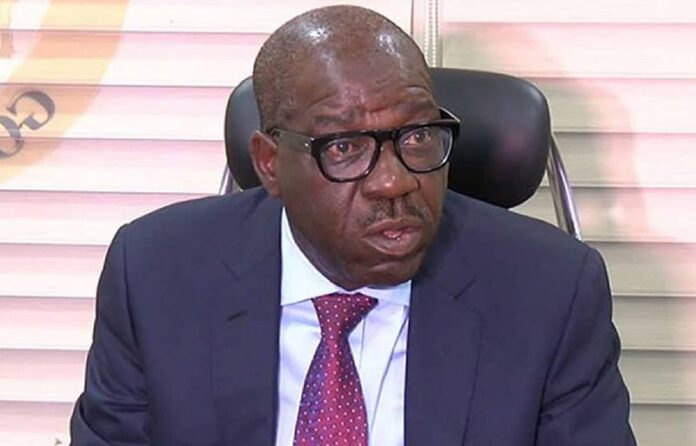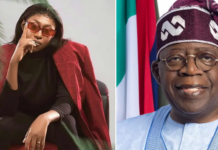Godwin Obaseki’s eight years of profligacy and Esanland

By Peter Omonua
First, let me apologize to Esan families, friends, and associates that I canvassed to vote for Mr. Godwin Obaseki during his second term election campaign. Many of us were hoodwinked by his eloquence, oratory, and his portrayal as the underdog in the tussle between him and the Adams Oshiomhole camp.
Our reckoning at the time was “how could Oshiomhole, who had previously maligned Ize Iyamu, come back to sell his candidacy?” And why should he be playing the “Godfather of Edo politics’’, reminiscent of the Tinubu factor in Lagos, even inviting Tinubu to Edo as an interloper; hence the Slogan, “Edo No Be Lagos.”
Almost four years into his second term and eight years of full term, there is hardly any positive legacy as landmarks of his accomplishment in Esanland, except perhaps, the huge debt burden he would be leaving behind. I recently read that Edo State is now, either the most indebted or closest to the very top in the ranking of States’ indebtedness in Nigeria. With debt volume standing at a staggering N135 billion and $35.6 billion, there is no tangible development on ground to show for this humongous debt profile.
There has been so much opaqueness around the administration’s resource management, with unanswered questions about the utilization of the N18 billion Federal Government refund for federal roads constructed by Oshiomhole; the N24 billion Paris refunds; the N22 billion refund for excess deduction and a list of numerous inflows; not to mention internally generated revenues. For someone who supposedly came to the job from the financial sector, where cash flow management is second nature; this is a colossal failure and an unmitigated disaster.
READ ALSO: Modupe Onitiri’s declaration, Ibadan invasion and hypocrisy of Yoruba Nation agitation
The mystery around administration of a State has been laid bare by Alex Otti of Abia State. In less than a year on the saddle, there has been so much transformation to the face of Abia State. He came to the job from the same financial sector as Governor Obaseki. He does not need media spin doctors to throw up and showcase non-existent projects; people can see and point to specific activities going on. When he walks the streets of Abia, people troop out in large numbers to adulate him. Will Governor Obaseki receive similar accolade and show of affection in any of the villages, towns, and cities where he has been governor for almost eight years? Will any community in Esanland be nostalgic about Godwin Obaseki’s time in office? I doubt it.
A popular adage says the king whose reign brought succour to the people will be remembered; and the king whose reign inflicted agony and sorrow, stagnation and underdevelopment would also be remembered. How will the eight-year reign of Governor Obaseki be remembered in Esanland?
I ran an opinion poll across various communities in Esanland about his stewardship for this article; no single person I interviewed could point to a single initiative in their communities attributable to Governor Obaseki’s administration, not one. No one could tell me this project or that project was initiated during Obaseki’s tenure, and, because of the project, their lives have been improved beyond what it was before the Obaseki administration. Not roads, not water, not electricity, not education.
Perhaps from the outset of its conceptualization, the ‘’Alaghodaro’’ initiative was designed to focus on Benin and its immediate environs. I am told the term “Alaghodaro” translates to “progress”; so, let him tell the Esan people what progress has been recorded in their domain as a direct offshoot of “Alaghodaro”.
While I do not have any issues with Barrister Asue Ighodalo and his gubernatorial ambition, there are concerns about the vehicle through which he emerged. If Godwin Obaseki has dealt so unfairly with Esanland, paying them back with outright neglect for the love Esan sons and daughters showed him by overwhelmingly supporting his elections, what benefit could we possibly derive from anything coming from his camp?
There are Edo political observers who describe Ighodalo as one of those Lagos boys, coming to Edo to fleece it of whatever is left of Obaseki’s years of affliction, and the loots ferried back to Lagos. They opine that his father may have been an Esan man, but that he does not exactly have any kindred spirit to Esan nor its people; that his affinity is to his Yoruba mother and her people.
Valid as this argument might be, I am personally more disturbed about the vehicle through which he emerged. How can Obaseki, who ‘disrobed’ the Esan people be the one saying, ‘I am bringing someone that will give you clothes to wear’? If someone could be so belligerent, so fickle as to spend eight years bickering about inconsequential with opponents and even associates, and not providing social and infrastructural change to Esanland, how can same person go about Esanland to preach to them to vote for a candidate of his choice? What will be his “business case”, as they say in project management? Which rational mind will expect that anointed candidate to deliver to Esanland, that which Obaseki himself could not deliver? His association with Ighodalo might constitute a baggage on the prospect of Ighodalo candidacy, as far as Esanland is concerned.
Regarding Mr. Phillip Shaibu’s insistence to run for the Edo governorship, we don’t know what commitment Obaseki made to him to get him on board for his second term run, which he (Obaseki) later reneged on. Obaseki might have promised Shaibu that if he supported his second term, he would do this or that for him in return.
How do you qualify someone, who would dispense with his deputy (who stood by him during his most trying and tumultuous political battle), irrespective of what might have transpired? I can only surmise that it was engendered avarice and an inordinate thirst for power, which is quite transient.
Personalities like Obaseki, who harbour the political philosophy of “the end justifies the means” are potential disaster, either at the State or National level. For such characters, hidden behind the facade of altruistic public interest is a hidden egotistic self-interest; an insatiable appetite for primitive accumulation, which in the long run neither satisfy their cravings nor add to their self-worth. When it’s all said and done, “Best Men are Still Men in their Best”.
Obaseki was apparently only concerned about winning the election when he might have committed to Shaibu. There is an old saying that “a politician thinks of the next election; a statesman thinks of the next generation.” When renowned Professor at Columbia University, Jeffrey Sachs said “politicians don’t aim to solve problems but to maintain power”; what immediately comes to my mind are characters like Obaseki. For such people, power is only desired for the sake of having it, not as an instrument of change.
Granted it is human to be flustered by his recent experience, Phillip Shaibu should be advised to shake it off. He should be consoled that Obaseki did not only disappoint him, but he also disappointed the Esan people. Phillip Shaibu should be comforted in the assurance that lots more constituents are vicariously embarrassed by Obaseki’s stewardship.
A true warrior knows when it becomes imperative to withdraw. He should not lose any more sleep over the chicanery and shenanigans of Obaseki. Let Shaibu know that he has achieved a lot within a relatively short span of his political career, while it is not yet even dusk for him. Many his age are just commencing their political journey. Obaseki has only exposed his foxiness through and because of him. Future associations that Obaseki craves (either politically or in business) would know to tread carefully while dealing with him. They would be careful to execute what could be described as political or business prenups.
Postscript
And to the Esan political leaders; senators, local government chairmen, councillors, and House of Assembly members; you need to examine yourselves. For most of Esanland, there is no demonstrable evidence of leadership going by the terrible infrastructural decadence you see all around. For God’s sake, how can it be heard of that some communities have to travel kilometers to get water in these day and age? If the national and state level administration has essentially neglected your communities, must you also neglect your people? Do you just answer “Honourable” without bringing any honour to your communities? If you had been awakened to your responsibilities, Obaseki would not have ridden roughshod over the Esan people as he has unabashedly.
I see videos and pictures of communities in Esanland and cannot but ask myself “Where are the political leaders and office holders? Where are the representatives of these communities?” Yet most of you fly wives and children to enjoy the luxurious things of life that politicians like you have provided in their own countries. That is colossal failure of leadership.
- Peter Omonua wrote in from Ontario, Canada and can be reached via pomonua@yahoo.com














